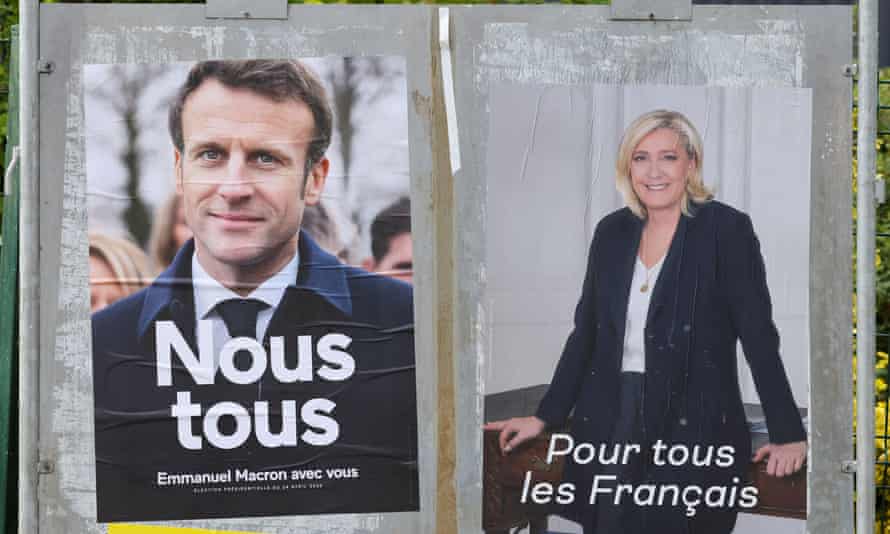Who wins the presidential election? FranceOne man is bent on marginalizing them and limiting their powers.
Even before you know the outcome tomorrow the leader of the radical left Jean-Luc MelenchonHe, who has emerged as a surprise kingmaker, called on voters to appoint him prime minister in the June legislative elections.
Melenchon, a strong opponent of both Emmanuel Macron And Marine Le Pen, they vowed that, if successful, he would force whoever wins the Elysee keys tomorrow into an uncomfortable parliamentary “coexistence” that would hamper their efforts to pass reforms opposed by the left.
The 70-year-old La France Insoumise (LFI – Unbowed France) leader, who promised to retire after his third presidential bid, said giving his party a majority in the Assemblée Nationale would make the election a “third round”. It would also solve the dilemma of those voters – especially on the left – who felt politically orphaned by the first-round result two weeks ago. Many of the 7.7 million people who voted for Melenchon said they would abstain tomorrow.
Last week, Macron, 44, and Le Pen, 53, crossed France in an effort to woo the nearly 50% of voters who did not vote for either of them, the LFI engaged in frantic negotiations with environmentalists and communists to form a united opposition bloc. Final winner. Polls released on Friday suggest Macron remains the favourite, but the legitimacy of his second term will be called into question if he does not secure a convincing victory.
Legislative voting traditionally revolves along party lines, but Melenchon is determined to make it personal. I ask the French to elect me as prime minister. I ask them to elect the majority of Parliament members from La France Insoumise. I invite everyone who wants to join the People’s Union [of the left] To join us in this beautiful battle.”
He reminded voters that it was the prime minister, not the president, who signed government decrees. “I will be prime minister not thanks to Macron or Ms Le Pen, but because the French wanted it,” he said, adding that it would make the president “secondary”. He ruled out any negotiations with the new president.
“If it doesn’t suit the president, they can go, because I won’t,” he said in an interview with BFMTV.
Melenchon’s ambitions were then reinforced He received only 421,308 votes behind Le Pen in the first round on April 10which witnessed the collapse of the traditional left and right parties. The other three left-wing candidates – from the Environment Party, the Communist Party and the Socialist Party (PS) – got just over 3 million votes. That would have secured him a place in the second round had they backed his campaign.
The result infuriated many Melenchon supporters, particularly young people and those living in working-class areas, leading to protests at Paris universities including the Sorbonne and Sciences Po, although 41% of 18-25s – more than 4 million voters – abstained from voting in the first round.
Campaigning for the 577 seats in the French House of Representatives will begin on May 10. La Republique en Marche (LREM) to which Macron the centrist currently belongs, holds 263 seats, while the conservative opposition, Les Republics, holds 93; Central Moden, 52; PS, 25 and La France Insoumise only 17.

Melenchon insisted that his popular union was leading in 105 constituencies, and that a majority of 290 constituencies was “possible”. “If I don’t fight for this victory, what do I do: I say ‘Go ahead, give them all the power’? I don’t want Mrs. Le Pen to win the country and I don’t want Macron to retain power. I say there is a third round. “The French have to,” he said in an interview last week. They decide who is the prime minister.
Mélenchon will need the support of all France’s left-wing voters, some 11.8 million of whom voted in the first round, if he has any chance of a majority in parliament after elections on June 12 and 19. Mélenchon rejected any suggestions for any alliance with PS.
Manon Aubry, a member of the European Parliament from the LFI party, spent the past week negotiating with the left-wing parties to form a coalition for the legislative elections. “There are hurdles, but a shared desire to create a union around the programme,” Aubrey said. Foreman.
When asked about the Socialist Party, she added that the party would have to abandon its “neo-liberal stance”. “We have put a certain number of conditions on the table and the ball is in their court. The question is, are they ready to advance towards us?”
Antoine Prestel, a political analyst and director of the Opinion Watch at the left-leaning Jean Jaures Foundation, said Melenchon has had political success, learning the lesson of 2017 when he failed to unite the left after the presidential election.
“After 2017, he has not managed to maintain high-level support for subsequent elections, and he wants to do it differently this time,” Pristel said.
He is trying to strengthen his support base and he has realized that the way to do so is from a position of strength.
It is not about how many MPs he will have but whether he can get environmentalists and communists behind him before the legislative elections, thus creating political power. I honestly think he didn’t want PS to join him; He considers that the party does not represent much now and will die on its own, so joining it will be more negative than positive.”
Laurent Gauvrin, former director of the newspaper Releasehe said that LFI’s partners are expected to “subject” rather than be allies, and they should subscribe to Mélenchon’s policies including withdrawing from Europe.
These attitudes are not from non-Melanchonian left voters, and even less so from centrist voters.
Govrin wrote: “This is the eternal problem of the radical left: it has a chance in power but in no way wants to unite to achieve it.”

“Lifelong food lover. Avid beeraholic. Zombie fanatic. Passionate travel practitioner.”
